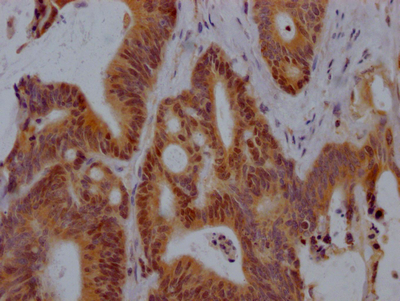-
中文名稱:CDKL3兔多克隆抗體
-
貨號:CSB-PA150181
-
規(guī)格:¥2024
-
圖片:
-
其他:
產(chǎn)品詳情
-
產(chǎn)品名稱:Rabbit anti-Homo sapiens (Human) CDKL3 Polyclonal antibody
-
Uniprot No.:
-
基因名:CDKL3
-
宿主:Rabbit
-
反應種屬:Human
-
免疫原:Synthesized peptide derived from internal of Human CDKL3.
-
免疫原種屬:Homo sapiens (Human)
-
克隆類型:Polyclonal
-
純化方式:The antibody was affinity-purified from rabbit antiserum by affinity-chromatography using epitope-specific immunogen.
-
濃度:It differs from different batches. Please contact us to confirm it.
-
產(chǎn)品提供形式:Liquid
-
應用范圍:ELISA,IHC
-
推薦稀釋比:
Application Recommended Dilution IHC 1:50-1:100 -
Protocols:
-
儲存條件:Upon receipt, store at -20°C or -80°C. Avoid repeated freeze.
-
貨期:Basically, we can dispatch the products out in 1-3 working days after receiving your orders. Delivery time maybe differs from different purchasing way or location, please kindly consult your local distributors for specific delivery time.
引用文獻
- AC-motif: a DNA motif containing adenine and cytosine repeat plays a role in gene regulation JH Hur,Nucleic acids research,2021
相關產(chǎn)品
靶點詳情
-
基因功能參考文獻:
- NKIAMRE is a member of a conserved family of kinases with homology to both MAP kinases and cyclin-dependent kinases PMID: 12927787
- cdkl3 transfected in anchorage-independent (suspension) HeLa cells overexpressed relative to attached cells and lead to elevated proliferation and faster transition G0/G1 phases to S phase relative to controls. Same in two HEK-293 and a CHO cell lines. PMID: 17945021
- data suggest that the CDKL3 gene is a strong candidate for nonsyndromal autosomal dominant mild mental retardation PMID: 18412109
-
亞細胞定位:Cytoplasm.
-
蛋白家族:Protein kinase superfamily, CMGC Ser/Thr protein kinase family, CDC2/CDKX subfamily
-
數(shù)據(jù)庫鏈接:
Most popular with customers
-
-
Phospho-YAP1 (S127) Recombinant Monoclonal Antibody
Applications: ELISA, WB, IHC
Species Reactivity: Human
-
-
-
-
-
-





















